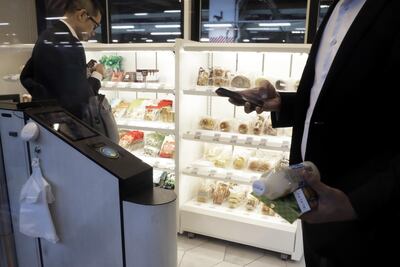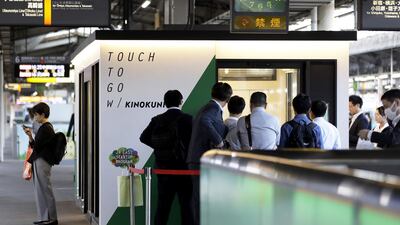Amazon is betting that stores of the future won’t have any clerks or registers. A company in Japan thinks it can get there first.
Signpost, which has a staff of about 100, has already deployed its technology in a kiosk on the platform of a train station in Tokyo. It’s an ideal testing ground: a small space no bigger than a bedroom with dedicated entry and exit points, and commuters in a hurry.
The shares of Signpost, which is planning to unveil a product deal with a major retail chain by the end of this year, climbed 9.3 per cent to 5,460 yen (Dh176) at the close on Thursday, a record since the company’s market debut a year ago.
Cameras and artificial-intelligence software track merchandise and purchases. Founder Yasushi Kambara calls it the “Super Wonder Register,” and says the system can be installed in any store. Investors are impressed. Shares of Signpost, which went public last year, have jumped more than 50 per cent since it unveiled the store in early October. The seamless shopping experience is almost identical to that at Amazon Go, the web retailer’s cashierless pilot store at its Seattle headquarters.
“There are already automated highway tolls and turnstiles at train stations,” Mr Kambara said. “In the same way, we want to automate store registers. That’s my dream.”
At stake is a smart-store market that’s projected to process more than $78 billion in annual transactions by 2022, according to Juniper Research. Amazon chief executive Jeff Bezos is also wagering that seamless shopping is the future of retail. The e-commerce company is said to be planning to open as many as 3,000 Amazon Go outlets in the next few years. A spokeswoman for Amazon declined to comment on Signpost’s new store.
Signpost will begin selling its product to Japanese and overseas convenience stores, supermarkets and train station kiosks next year. Kambara says it will cost a retailer about 100 million yen ($880,000) to install the Super Wonder Register system in a supermarket of about 500 square metres. He predicts that Signpost will install 30,000 systems in Japan by February 2021, including the Wonder Register, a simpler checkout terminal that identifies products using cameras. Including sales overseas, “we will be higher than our target”, Mr Kambara said.

From Alibaba to Tencent and fledgling outfit BingoBox, Chinese companies are experimenting with their own smart stores. Tencent opened a 300 square metre “We Life” outlet this year, while Alibaba set up a cashierless cafe in its hometown of Hangzhou. In Japan, Signpost may see some early competition: San Francisco-based startup Standard Cognition is planning to roll out its camera-based automatic checkout technology with the goal of being in 3,000 retail locations by 2020.
The US startup has a deal with the Japanese suburban drugstore chain Yakuodo and plans on partnering with existing retail businesses in the country. Other large convenience store and supermarket operators have also approached Standard Cognition.
Japan’s retail market is potentially an exciting market for automated checkouts; for example, there are more than 55,000 convenience offering snacks, drinks and packaged food, as well as banking and delivery services. They often struggle to find clerks, and have increasingly hired non-Japanese to stock shelves and ring up purchases.
__________________
Read more:
‘Merging man and machine doesn’t come without consequences’
Why do people love unboxing videos?
__________________
Tomoaki Kawasaki, an analyst at Iwai Cosmo Securities, said Signpost is probably the only company besides Amazon that can provide the know-how. The labour shortage will also spur adoption, he said. “They’re very fast at developing this technology,” Kawasaki said.
So far, Signpost is winning over customers like Chiaki Chushi, who recently picked up a drink at the Akabane station kiosk. The store stocks items such as rice crackers, bottles of green tea and other sundries. With the same electronic payment card used for rail fares, shoppers tap in when they enter the store. At the exit, they stand in a highlighted area and can check their purchases on a screen before tapping out. “It was really smooth,” Ms Chushi said.
Mr Kambara, 52, started his company a decade ago after working at Mitsubishi UFJ Financial Group’s tech department. Signpost’s main business is consulting, but the goal from the beginning was to develop a cashierless register, he said. After years of experimenting with putting sensors inside shopping carts, engineers switched to machine learning to build their image-recognition system.
Signpost’s stock is up more than ninefold since its initial public offering a year ago, giving it a valuation of about $400 million. While the Super Wonder Register is losing money and makes up less than 7 per cent of revenue, it will be profitable next year and become the main business by 2021, Mr Kambara said. The key will be getting retailers to understand the benefits of the technology.
“Amazon won’t share their Go technology with others,” Mr Kambara said. “They’re going to try and kill off existing retail stores, so we want to give retail shops the weapons they need to fight back.”

